73+ Sample Event Proposal Templates
Check out the following event proposal samples in PDF and Word formats for your reference.
-
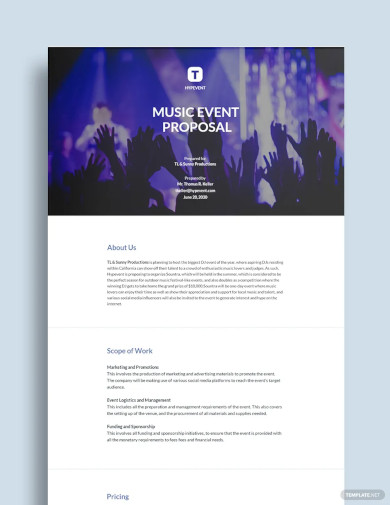
Event Proposal Template
download now -
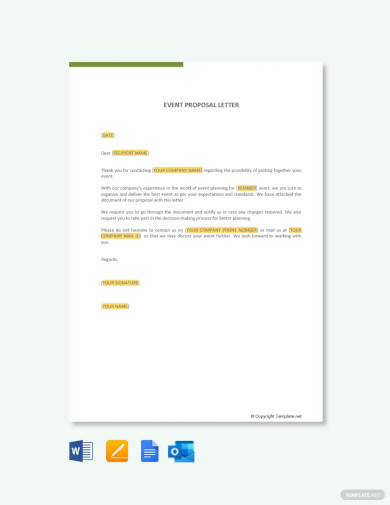
Event Proposal Letter Template
download now -
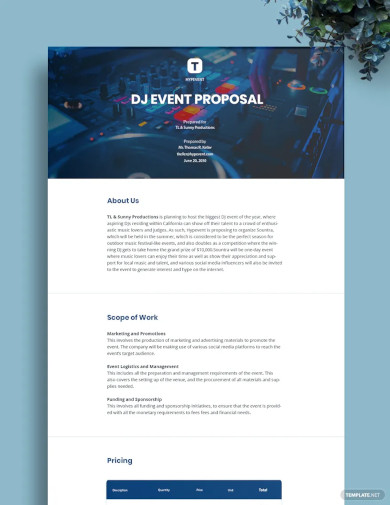
DJ Event Proposal Template
download now -
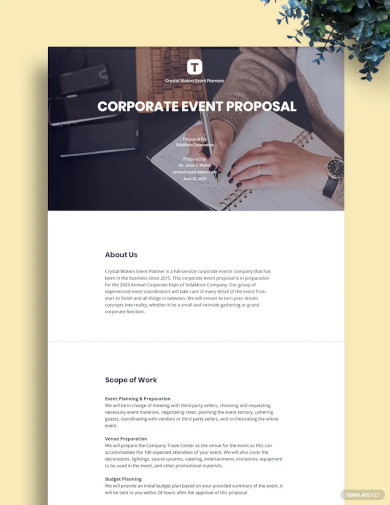
Corporate Event Proposal Template
download now -
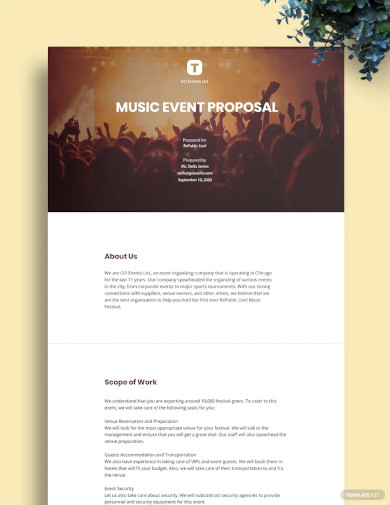
Music Event Proposal Template
download now -
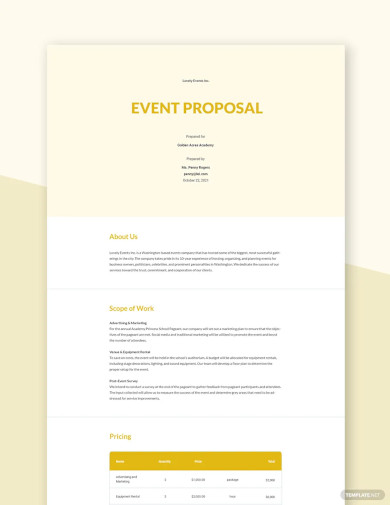
Simple Event Proposal Template
download now -
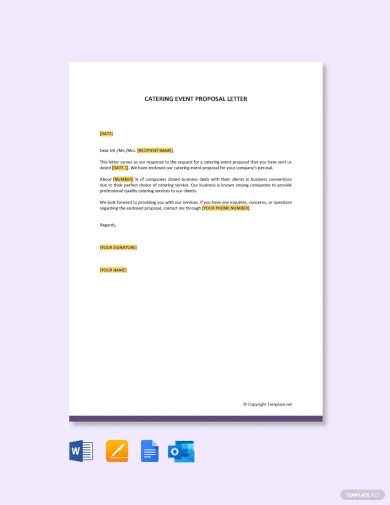
Catering Event Proposal Letter Template
download now -
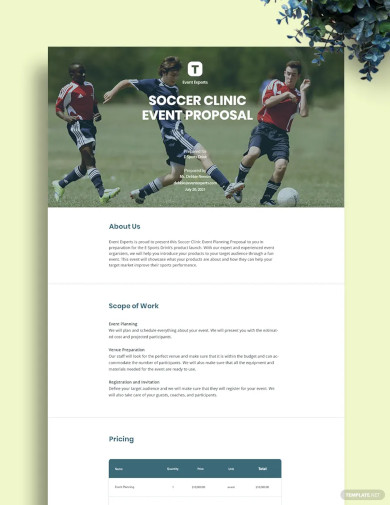
Sports Event Proposal Template
download now -
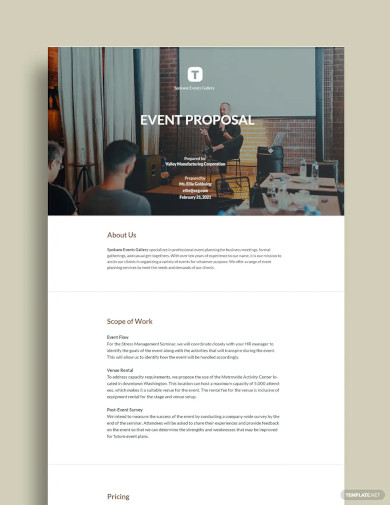
Sample Event Proposal Template
download now -
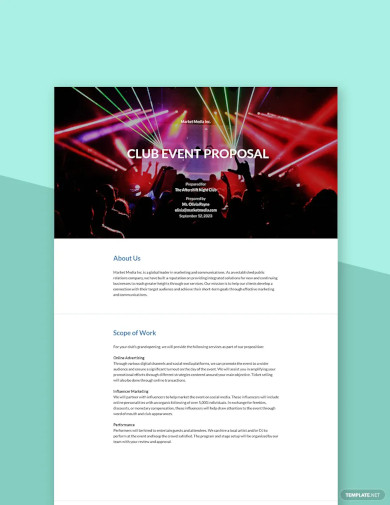
Club Event Proposal Template
download now -
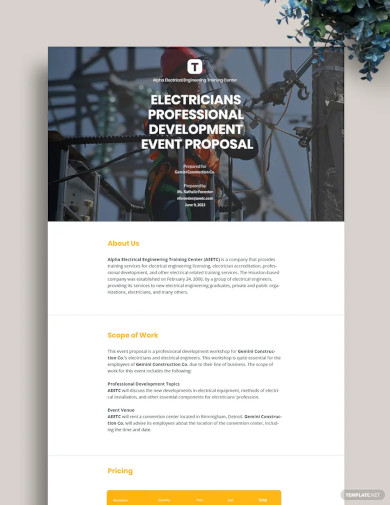
Event Proposal Example Template
download now -
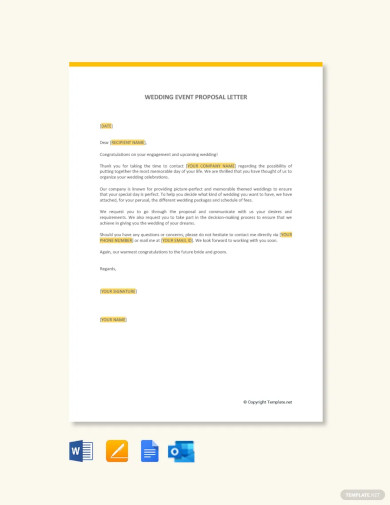
Wedding Event Proposal Letter Template
download now -
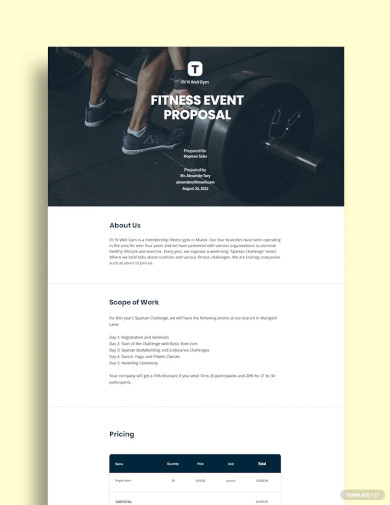
Fitness Event Proposal Template
download now -
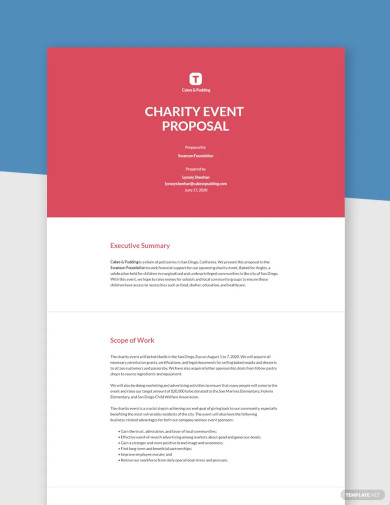
Charity Event Proposal Template
download now -
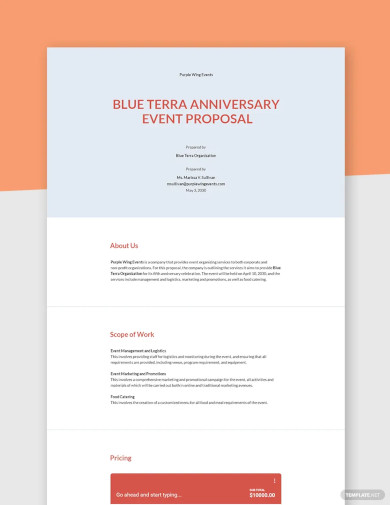
Non Profit Event Proposal Template
download now -
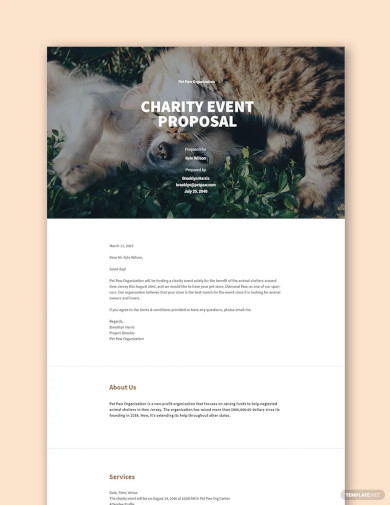
Sample Charity Event Proposal Template
download now -
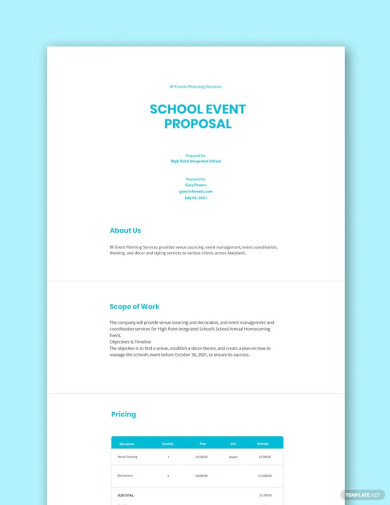
School Event Proposal Template
download now -
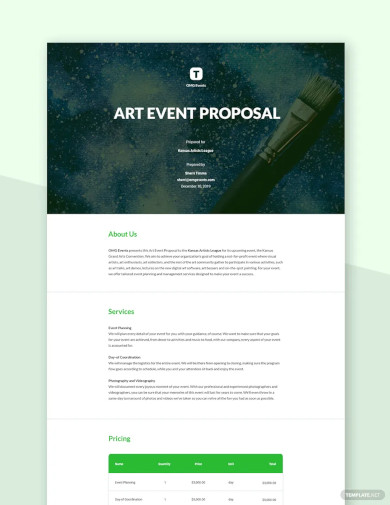
Art Event Proposal Template
download now -
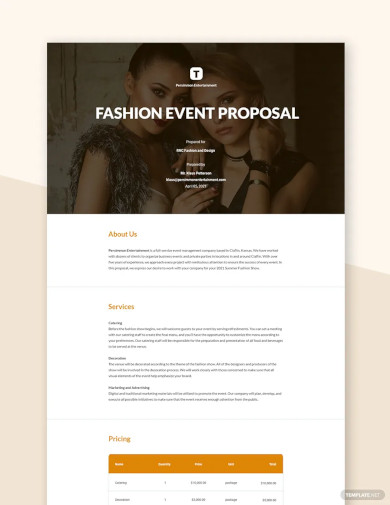
Fashion Event Proposal Template
download now -
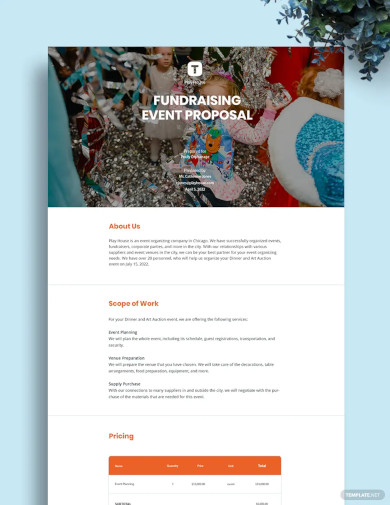
Fundraising Event Proposal Template
download now -
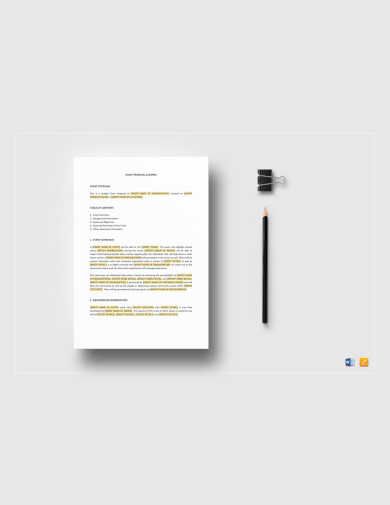
Event Proposal Example
download now -
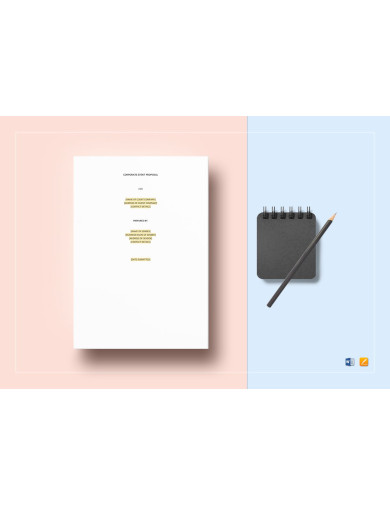
General Corporate Event Proposal Template
download now -
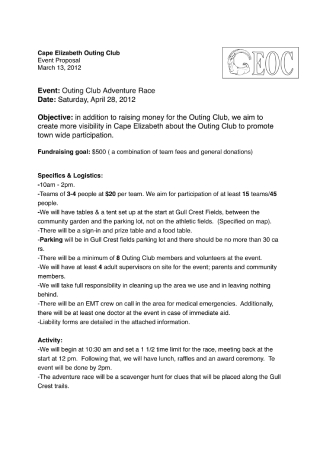
Adventure Race Event Proposal
Put your race plans into paper with an event proposal.
-

Art Event Sponsorship Proposal
Seek sponsorship for your annual Art Walk using an event sponsorship proposal.
-

Asian Culture Festival Proposal
Display the vibrancy of Asian culture by using an event proposal to execute your plans.
-
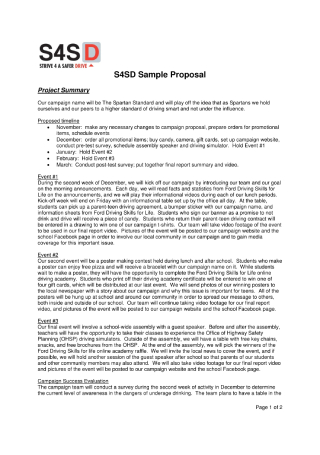
Campaign Event Proposal
Make up a proposal for your campaign event with the help of this sample.
-
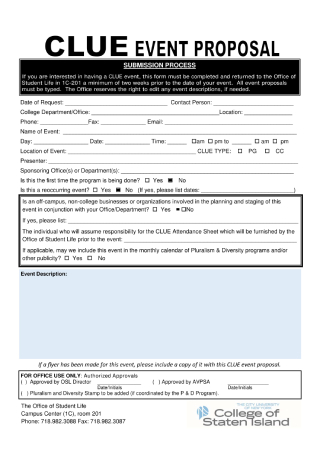
Campus Event Proposal
Organize on-campus events through the given proposal sample.
-
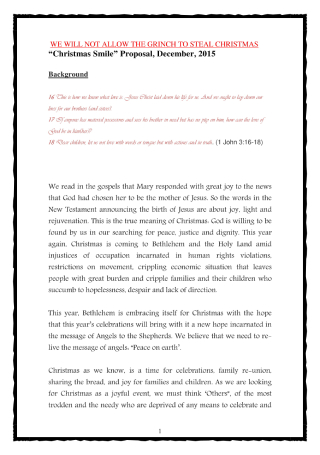
Christmas Event Proposal
Celebrate a day of Christmas festivities with the use of an event proposal to pitch your ideas.
-
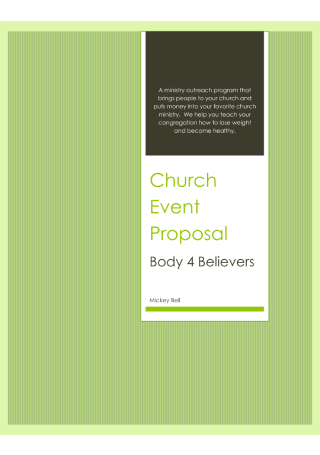
Church Event Proposal
Help put money into your church ministry with an event proposal.
-
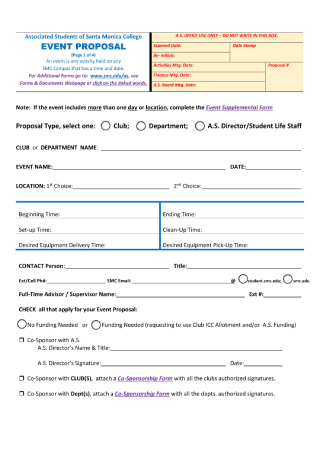
College Event Proposal
Host an event at your college with this event proposal.
-
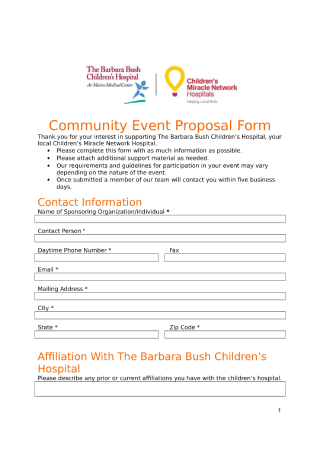
Community Event Proposal Form
Use this proposal form to suggest an idea for your local community event.
-

Community Event Sponsorship Proposal
Gather sponsors for your community event using this proposal.
-
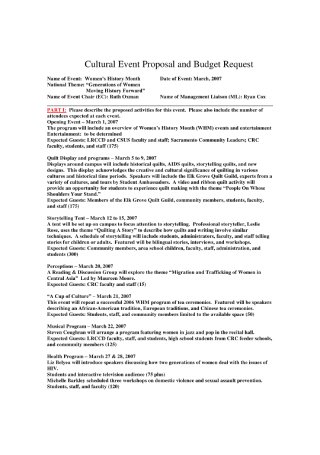
Cultural Event Proposal and Budget Request
Lay out the details and budget of your cultural event in a proposal.
-
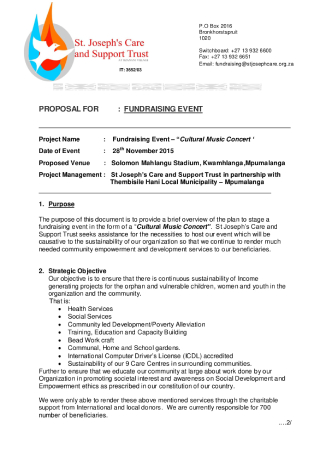
Cultural Music Concert Proposal
Bring cultural music to the public by using a proposal to host your own concert.
-
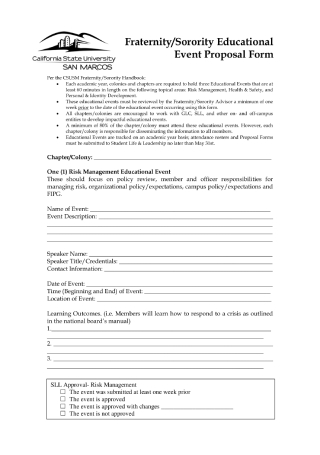
Educational Event Proposal Form
Throw an education event for your fraternity or sorority with this proposal form.
-
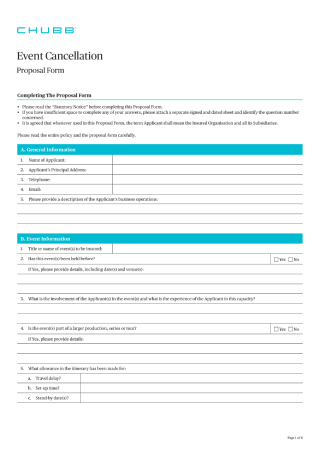
Event Cancellation Proposal Form
Secure an insurance for your event by downloading this cancellation proposal form.
-
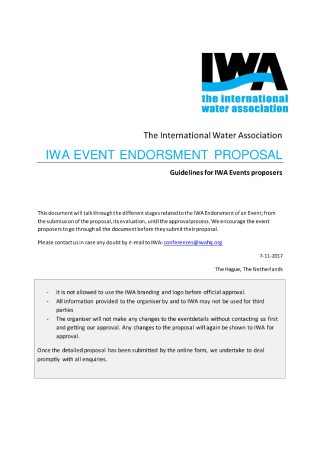
Event Endorsement Proposal
Help your event reach its full potential by persuading sponsors to fund it through a proposal.
-
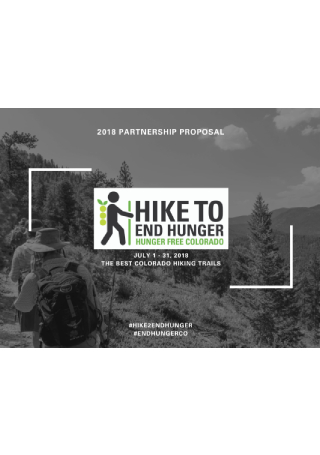
Event Partnership Proposal
Show what you can bring to the table with an event partnership proposal.
-
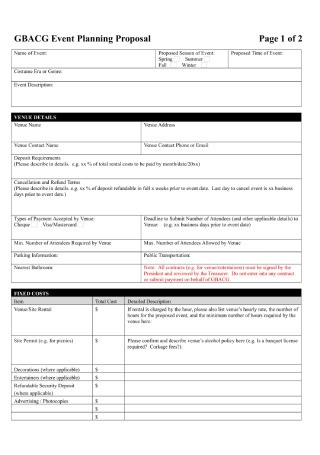
Event Planning Proposal
Market your services and secure a client’s business using an event planning proposal.
-
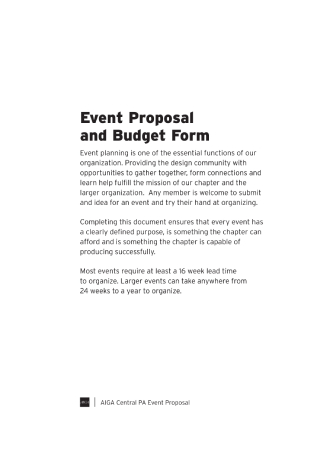
Event Proposal and Budget Form
Set your budget and event plans in a detailed proposal form.
-
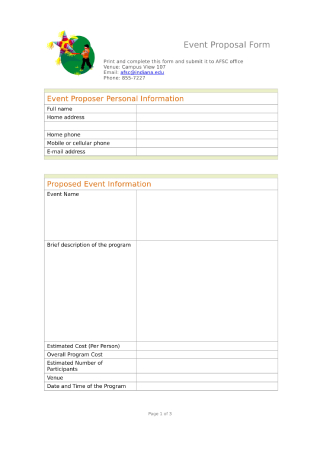
Event Proposal Form
Offer your event management and planning services through a proposal form.
-
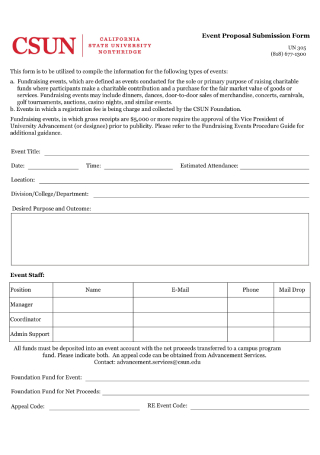
Event Proposal Submission Form
Compile the necessary information for your event in a proposal submission form.
-
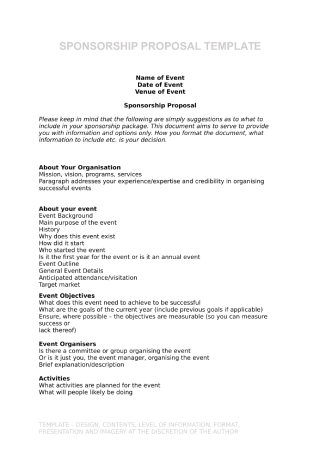
Event Sponsorship Proposal
Gain sponsorships for your upcoming event with the help of the sample provided.
-
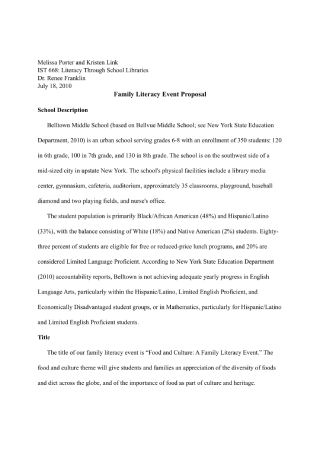
Family Literacy Event Proposal
Support family literacy initiatives by hosting an event using this proposal.
-
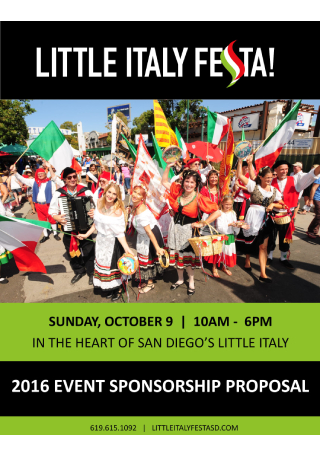
Festival Sponsorship Proposal
Support your community’s festival by acquiring sponsorships through a proposal.
-
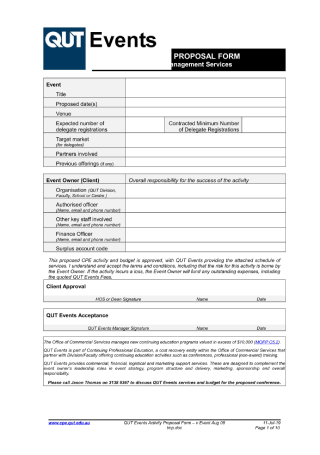
Full Service Activity Proposal
Prepare a full service activity proposal with the help of this sample.
-
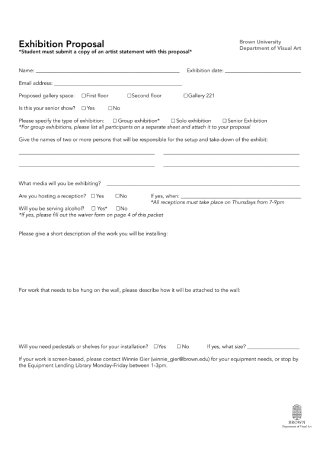
General Exhibition Proposal Form
Express your interest in holding an exhibition through a proposal form.
-
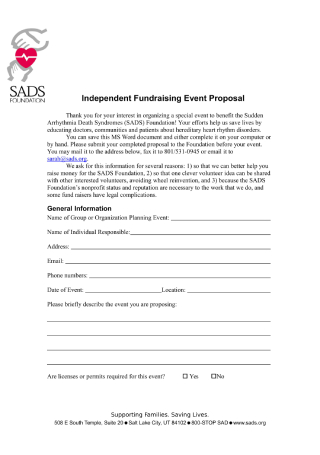
Independent Fundraising Event Proposal
Provide relevant information about your fundraising event in a formal proposal.
-
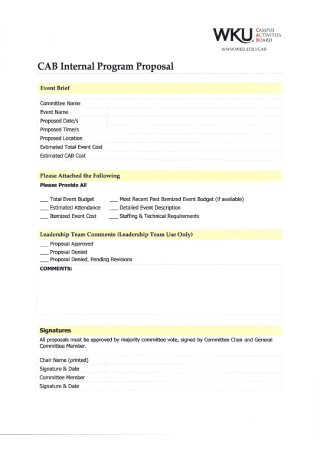
Internal Program Proposal
Discuss your plans for various campus activities in an internal program proposal.
-
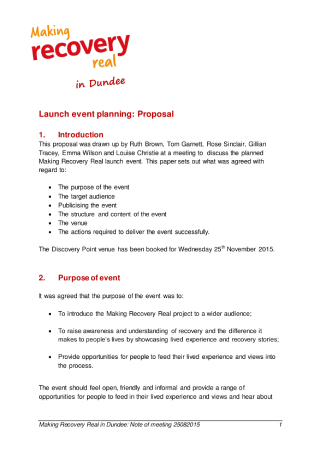
Launch Event Proposal
Outline the concept of an event for the forthcoming launch of your brand in a proposal.
-
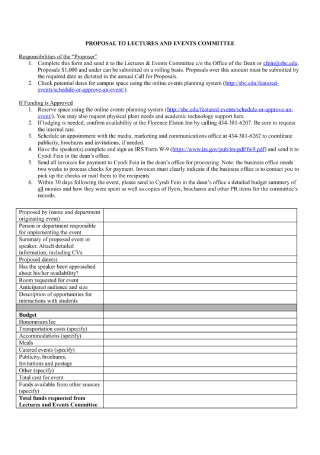
Lectures and Events Proposal Form
Submit your proposal to the lectures and events committee by filling out this form.
-
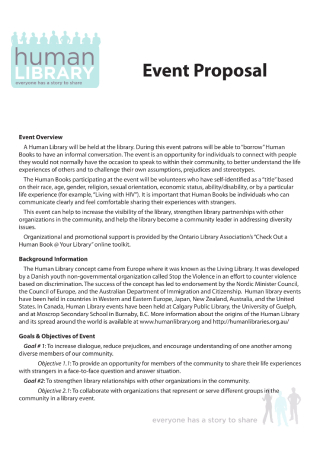
Library Event Proposal
Create an overview of the library activities you have planned in an event proposal.
-
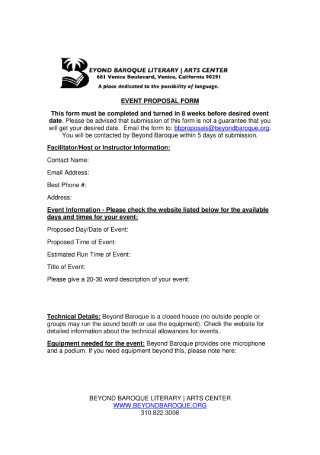
Literary Event Proposal Form
Request for author appearances at your literary event through a proper proposal.
-
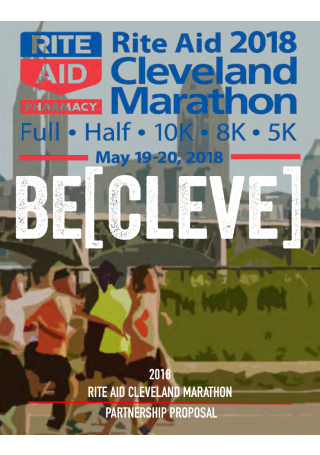
Marathon Event Partnership Proposal
Arrange a fun and memorable marathon by forming partnerships using an event proposal.
-
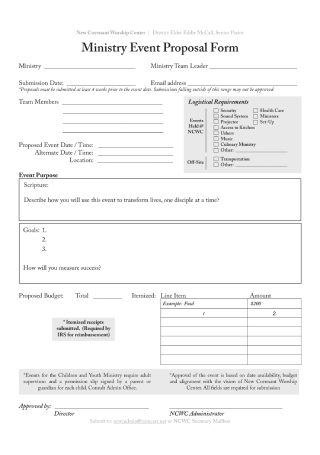
Ministry Event Proposal Form
Transform lives by organizing a successful ministry event through a proposal.
-
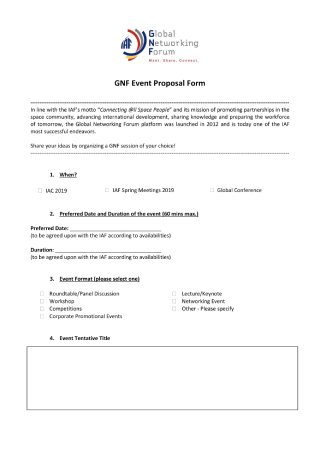
Networking Event Proposal Form
Organize the perfect networking event by creating a proposal to define your plans.
-
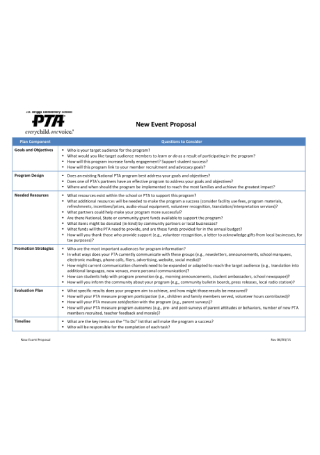
New Event Proposal
Seal the deal with a client or sponsor by creating the best event proposal using this sample.
-
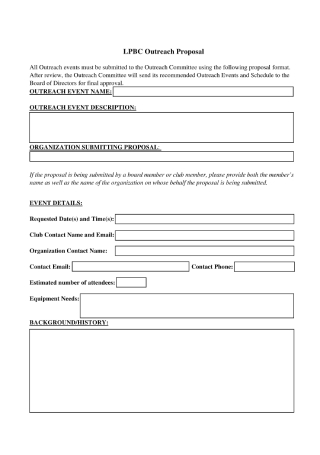
Outreach Event Proposal
Pitch your outreach ideas to supporters through an event proposal.
-
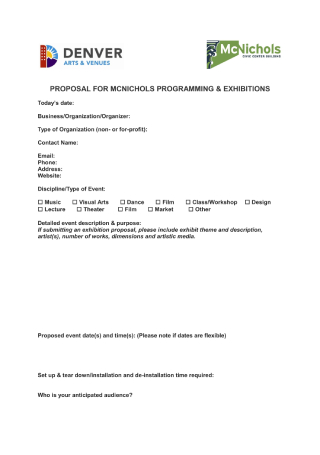
Program and Exhibition Event Proposal
Craft a proposal for art programs and exhibitions with the help of the given sample.
-
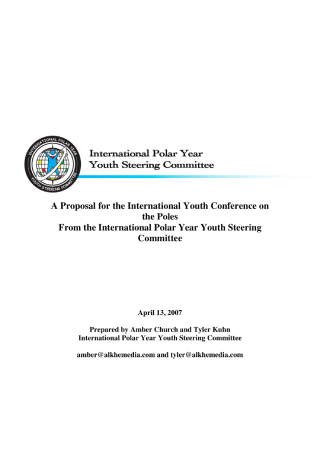
Proposal for the International Youth Conference
Share your ideas for the International Youth Conference in an event proposal.
-
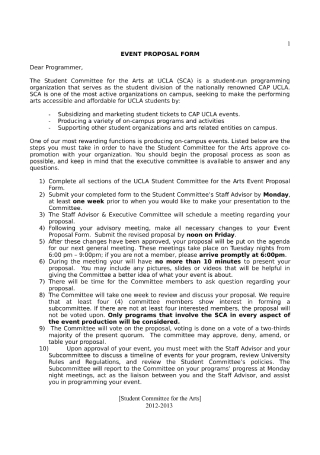
Simple Event Proposal
Create an event proposal with ease through the sample provided.
-
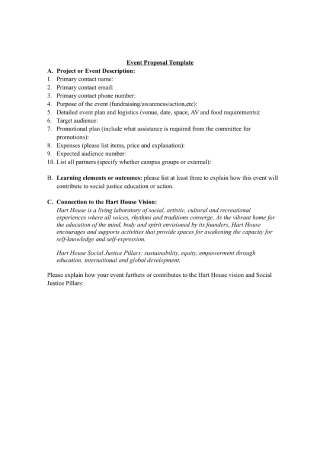
Social Event Proposal
Get new clients by writing a social event proposal that’s worth pursuing.
-
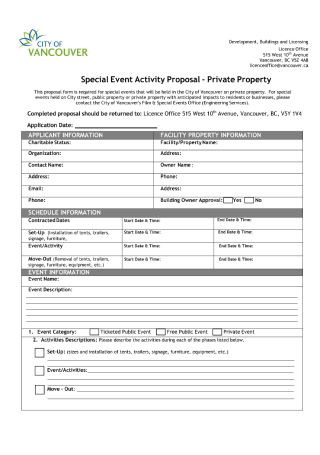
Special Event Activity Proposal
Host a city-wide event by outlining your activities in a special proposal.
-
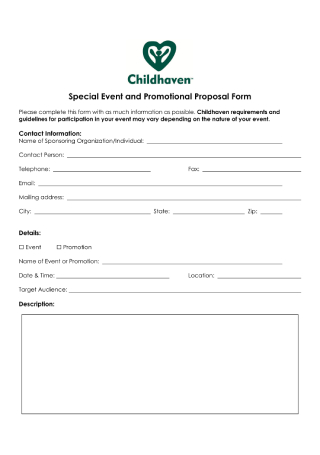
Special Event and Promotional Proposal Form
Give a quick rundown on your event and promotional activities in a proposal form.
-
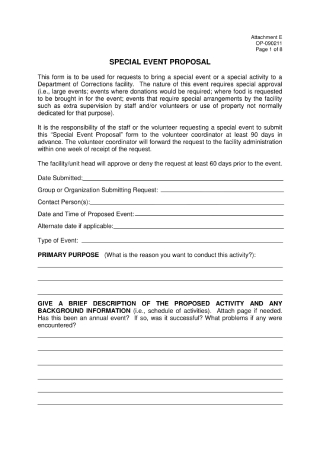
Special Event Proposal
Sell your event ideas to a prospective client with the perfect proposal.
-
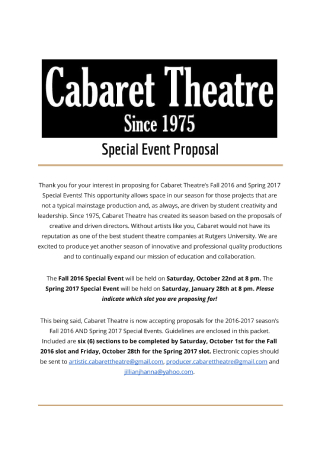
Special Theater Event Proposal
Define your theater event plans in a comprehensive proposal.
-
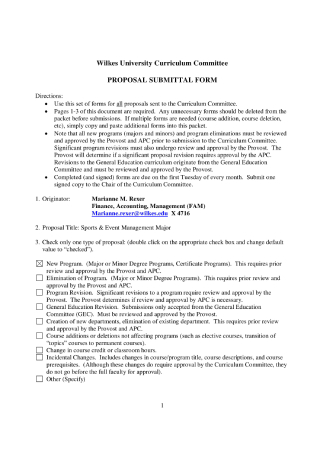
Sports Event Management Proposal
Look for funds to cover your sports event with the use of a proposal.
-
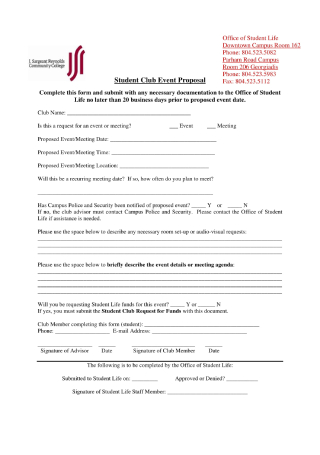
Student Club Event Proposal
Ensure the success of student club activities by producing an event proposal to gather funds.
-
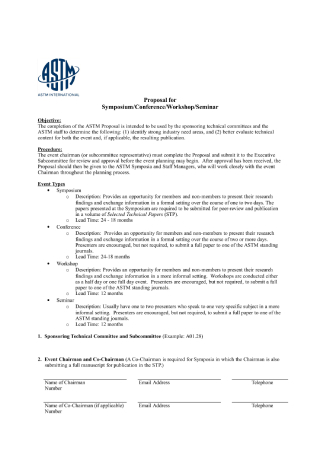
Symposium Event Proposal
Focus on the planning and implementation of your symposium in an event proposal.
-
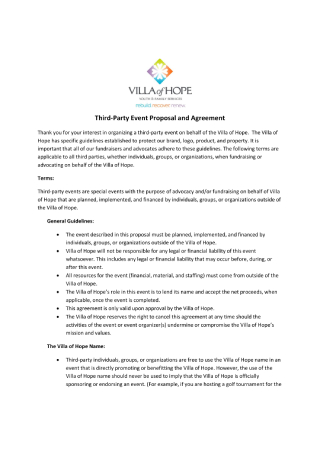
Third-Party Event Proposal and Agreement
Show your interest in organizing a third-party event through a proposal.
-
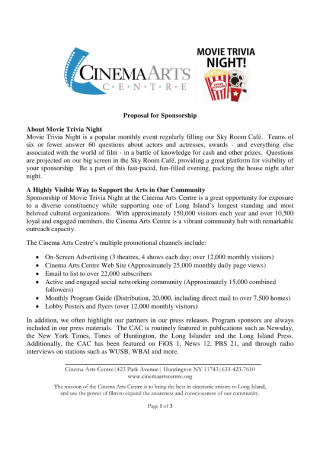
Trivia Night Event Sponsorship Proposal
Draft a proposal to set out the benefits that sponsors may obtain from your trivia night event.
-
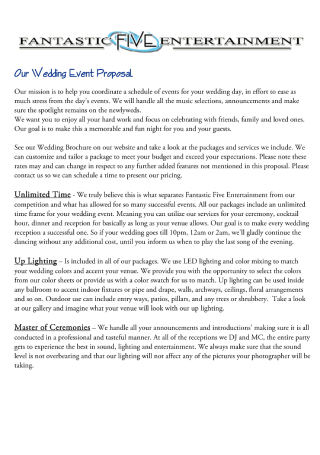
Wedding Event Proposal
Offer your wedding planning services to potential clients with the use of a proposal.
-
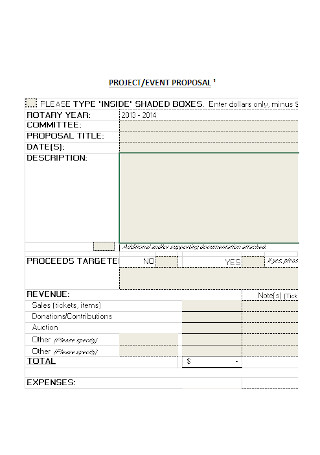
Project Event Proposal Form Template
download now
FREE Event Proposal s to Download
73+ Sample Event Proposal Templates
What Is an Event Proposal?
How to Make a Winning Event Proposal
A lot of time and energy goes into writing a flawless event proposal that will generate the best possible results. So in this guide, we’ll walk you through the basics on how you can make a killer event proposal to convey your ideas.
What Is an Event Proposal?
An event proposal is a comprehensive document that gives an overview of the services you will provide for an event. Consider it as your company brochure, marketing campaign, and sales pitch molded into one. This should prove your capacity to execute an amazing event for people to remember, while also establishing yourself as someone clients can rely on.
A crucial step in event planning is drafting a business proposal that contains the specifics of your work scope as well as the details on how you will carry out those plans. Hence, knowing what to include in the event proposal format is vital in securing a client’s project for your business.
Business Introduction
Talk about what you do. Clients likely possess little to no knowledge about your event planning business plan and the length of time it has been in operation. Briefly discuss your background, professional achievements, relevant experiences, and specialties in the introduction. You don’t have to get into detail about your business history, as long as clients can draw a clear picture of what it is that you offer.
Event Description
Clients want to make sure that you understand the event requirements that were set. This must be established by providing an overview of the scope of the event, along with a few suggestions that were discussed during your meeting with the client. You also want to be careful about giving away too many ideas, as this could steer your proposition away from the interests of a client. Keep your focus on the bigger picture by outlining your plans in an organized flow of information. This should tell a client when and where the event is going to take place, how long the planning process is going to last, and any event milestones that need to be noted of.
Services List
It’s important to be very specific in this section. It should list all the services that you will offer or provide to meet one’s needs. These offered services refer to the additional services that a client can have at the event if they wish for it. Provided services, on the other hand, are the services that are already in place as part of the event package. One example would be the food and beverages proposal included in a catering package. It’s best to list these items in bullet form or with subheadings to make it easy for clients to browse through your range of available services.
Work Portfolio
If you have experienced planning something similar in the past, then this is your chance to prove your skills through visual evidence of what you have already achieved. Photos, sketches, news clippings, and even testimonies from your former clients will paint you in a positive image. This is a great way to market your specialties by showing the actual product of your hard work.
Proposed Budget
Although your ideas might sound promising, some people just can’t afford it. You need to give your clients a chance to negotiate on matters that may be compromised by discussing the proposed costs beforehand. It’s important to present a breakdown of these expenses so that your client is aware of what is and isn’t going to cost them money. The event budget should cover the main items of the event and its cost estimates. Be sure to itemize your proposal to make it easy to understand. It’s also a smart way for clients to think twice about their expenses in order to make reasonable decisions on things that are and aren’t worth spending on.
How to Make a Winning Event Proposal
According to a study conducted by the Bureau of Labor Statistics, the event planning industry will continue to grow over the next decade by 11%, with an estimated number of 12,700 jobs added within the said time frame. As the demand for qualified event planning professionals increases, so does the number of businesses competing in the same market. Thus, your career as an event planner lives and dies on your capacity to formulate the best event proposal there is.
With so much at stake, creating your proposal template is one way to set yourself apart from competitors. Finding a style that works for you is much easier to replicate than having to craft the same type of document all over again from scratch. To help you design an event proposal for any given occasion, you may want to take the following points into account.
1. Speak to your client.
We all know how clients can be—they seek the services of a company that specializes in a particular craft, only to have a vague idea of what they want. When you work on a project without any expectations set, chances are you’ll be forced to revise it multiple times until the client is fully satisfied with the outcome. Even if a client does provide a request for proposal or an event proposal letter to outline the exact requirements, there might be a few things that you would want to clarify in person. Meeting with your client face-to-face is one way to avoid the hassle. This will draw a clearer picture of what your client’s needs are and how you can best deliver the vision that they have in their head.
2. Tell a story.
As human beings, we tend to get distracted pretty easily. This is a challenge that most writers have when trying to establish a connection with their audience. The secret is to evoke a reader’s emotions through storytelling. Stories have the power to capture and hold a person’s attention to solidify your pitch and convince a reader to agree with your ideas. The beginning, middle, and end of your proposal should maintain this connection to keep readers interested in what you have to offer. Thinking about this will also help structure your proposal in a way that leads to greater readability.
3. Plan your positioning.
Clients want to make sure they hire someone who knows what they’re doing, which puts you in the position of being the expert in that particular field of work. A well-thought-out event proposal gives you greater control over how clients can perceive you. Your recommendations should sound credible enough to add value to your expertise as an event planning professional and offer readers a reason to trust your abilities. It’s not just about taking orders from the person that pays you but it’s also about working as partners to achieve a successful event.
4. Put your ideas into detail.
Now to the main focus of your proposal—the nuts and bolts that make up a successful event. What you need is a solid rundown of how the puzzle will be pieced together to turn your vision into a reality. Clients can be very skeptical at the beginning, which is why it’s important to diminish these doubts by documenting your plans on print. These simple building blocks will help readers visualize on what your event can turn out to be with proper execution.
Don’t be afraid to offer your unique take on a client’s request. Every business has a distinctive quality that differentiates it from competitors. People will be drawn to your ability to turn a broad idea into something spectacular and unforgettable.
5. Pack on the finishing touches.
While a well-written content can always be used to your advantage, it’s also best to consider your event proposal design. An impressive event proposal presentation matters to clients who want to know how much effort you can put into something so simple. You can insert pictures, colorful sketches, and other models that demonstrate what you’ve envisioned for the event. It’s about delivering an experience that can help communicate your plans and suggestions in amazing ways.
In addition to getting visual with your proposal, you need to make sure the information in its content remains clear, accurate, and easy to understand. Highlight points that are important and present them in a way that encourages further reading. The goal here is to make an event proposal that’s worth remembering after a client had just sorted through a desk full of proposals.
As someone who works in the field of event management, you know how important it is to make a proposal that can meet the needs of clients, earn sponsorship, or gain the admin’s approval. It shouldn’t be a letter that simply communicates your proposed plans. Rather, it should be a straightforward presentation of the specific ways you can turn a client’s vision into the real thing. By putting your clients at the heart of your event proposal, you’re sure to transform your event services into the most sought-after business in the industry!
